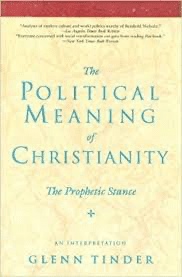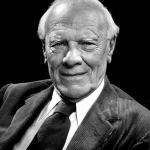The Political Meaning of Christianity: Preface and Prologue
Some of us here are reading and discussing together a book entitled The Political Meaning of Christianity by political scientist Glenn Tinder (HarperSanFrancisco1991). The purpose is to discern Tinder’s recommendation to us American Christians in this time and place (America in 2024). A question for discussion, throughout this collective reading and discussion, is whether our present circumstances would change what Tinder calls “the prophetic stance”—his own Christian perspective on the timeless and trans-cultural political meaning of Christianity. We will also discuss whether his perspective is correct.
Here, in this first installment, I will comment on the book’s Preface and Prologue. Next, on approximately (!) Monday, February 26, I will comment a portion of Chapter One: The Exaltation of the Individual. All five chapters are very long, so will divide them up. For Monday, February 26, please read the portion titled “Christian Love” (pp. 19-35).
The Preface constitutes Tinder’s reason for writing this book. “One of the main assumptions underlying this book is that our confusion and our Christian forgetfulness are connected.” (4) In other words, modern American Christians (and others) are confused about “the wisest course of public policy” and “the very meaning of their faith.” (4-5) “I hope to do something through this book to lessen such confusion.” (5)
Also in the Preface Tinder states that his is argument here has a “personal character” by which he means it is individual but not (he says) subjective. He argues that his perspective is thoroughly consistent with the Christian tradition and the Bible. On the other hand, it is not dogmatic in that it is not tied to any one denominational, confessional tradition or any one detailed theology (e.g., Reformed or Anglican or whatever). He admits a clear preference for Protestantism in its pessimism about humanity in its fallen condition.
In the Prologue Tinder states that, in his view, Christianity leads us to conclude that “Although every individual is exalted…society is not. On the contrary, every society is placed in question.” (7) This is the heart of what he calls the “prophetic stance.” According to him, Christianity leads us to question all ideologies and political platforms and grand policies (meta narratives?) while holding to belief in the coming kingdom of God but not acting politically to attempt to bring it about by human means.
”Nothing in history, nothing human, can be absolutely relied upon.” (9) The political meaning of Christianity, then, is a posture between cynicism and sentimentality (10) that abjures the moral naïveté of liberal theology and its call for revolutions while encouraging Christian “engagement and independence.” (14)
I am here, and will always, condense and omit as Tinder’s chapters are too long to summarize adequately.
Finally, Tinder declares that “The main thesis of the book is that Christianity points to a concept of civility that corresponds closely with our needs. To practice this concept is to adopt the posture I call the prophetic stance.” (16) He promises to explain and defend this prophetic stance more fully in the book.
My thoughts so far: I cannot help but agree with Tinder, so far. I find nothing with which to find fault. I would only ask him if the believes that ANY revolutions in history have been “worth it” from a Christian perspective? Sure, no revolution will bring about the kingdom of God on earth, short of the return of Christ and the coming of the kingdom in its fullness, but is the Christian to reject all revolutionary efforts to bring about a greater degree of approximation to the value of the kingdom? I would also ask him if he has really understood John Rawls correctly? I’m sure he read Rawls, but his understanding of Rawls’ theory of justice as fairness and mine are not the same. I agree, however, the Rawls’s theory is not identical with a Christian vision of justice which views justice as eschatological in its perfection. I don’t think Rawls thought it was, either.
*Note: If you choose to respond with a comment, make sure you have read the Preface and Prologue. If you have not and want to comment, read them now before commenting. If you comment, make sure it is relatively brief (no more than 100 words), on topic, addressed to me, civil and respectful (not hostile or argumentative), and devoid of pictures or links.*














